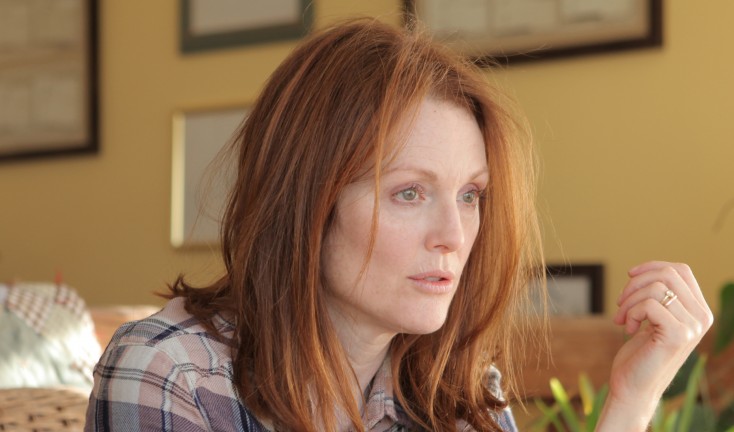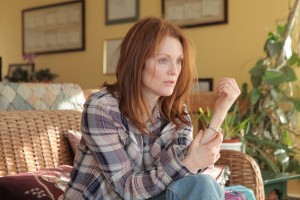By ANGELA DAWSON
Front Row Features
HOLLYWOOD—In “Still Alice,” four-time Oscar nominee Julianne Moore plays a woman who is diagnosed with early-onset Alzheimer’s disease. As the versatile actress does with so many of her roles, she took it upon herself to research the disease, it’s impact on those afflicted with it and the impact on their families. In particular, one woman, who was diagnosed with the disease in her mid-40s, moved her. The fact that she was a redhead—like Moore herself—struck a chord with the actress.
Though the neurological disease was robbing the woman of her memory, Moore saw a strength in this woman that she decided to imbue in her onscreen character.
Based on the novel, “Still Alice,” by Lisa Genova, the drama is adapted for the screen and directed by Richard Glatzer and Wash Westmoreland, whose collaborations have included “The Last of Robin Hood,” which starred Kevin Kline and Susan Sarandon and the Sundance Grand Jury and Audience award winner “Quinceanera.”
Glatzer, who holds a PhD from the University of Virginia was diagnosed with Amyotrophic Lateral Sclerosis (ALS), better known as Lou Gehrig’s disease, while developing the film. Though the disease progressed rapidly, Glatzer managed to co-direct it with Westmoreland, even though he lost the ability to speak by the time production began. For Moore, it was simply a matter of developing a different sort of communication (Glatzer now uses an iPad to communicate) with the filmmaker.[private]
The 54-year-old actress, who has been nominated for a Screen Actors Guild award for her inspired performance in this film, recently spoke about tackling the role of a college professor diagnosed with Alzheimer’s disease, communicating with Glatzer and working with co-star Kristen Stewart, who plays her slacker daughter who steps in to help at the right moment.
Q: How would you describe your character?
Moore: One of the things about this movie is that you are meeting this woman at a time where she has achieved a lot. She has been very successful in her career. She has a happy marriage and she has three kids that are well on their way. We really see her at the point where we all feel we would like to be. When she is hit with this news it is pretty dramatic and pretty life altering for the whole family. So I think that is interesting, just in terms of storytelling, in the sense that things can appear to be perfect or things can appear to be static but I don’t know that they always are.
Q: What did you find most appealing about taking on this role?
Moore: There is so much beauty in the movie. The beauty is at the beginning when you see this beautiful and wonderful family and there is beauty in watching them transform and react to their mother’s issues and illness. Then there’s beauty at the end when you realize what it’s all been about.
Q: Like Alice, you’re a working mom. How do you balance it all?
Moore: Sometimes we have this discussion about work-family, family-work and it sounds like a facile discussion. “How do you balance it all? How do you have the time for this and that?” At the end of the day isn’t that all there is? That’s what we have. We have the work that we want to do and that’s the way we express ourselves. Then we have the people in our lives that we love.
Q: Have you had personal experience with Alzheimer’s?
Moore: No, I have had no personal experience with Alzheimer’s. I’ve been lucky on that score.
Q: Nobody really knows what it is to be sick with this disease. Was it very disturbing for you to start with?
Moore: It’s great that you started the question with, “Nobody really knows.” That, of course, is the great challenge. That is what we talked about a lot when we were working on the movie. This is an unusual project and it’s the first movie that I have seen that talked about a condition like this, presented completely subjectively.
Generally, we see all these stories and they are from the caretaker point of view or a different family member. This is inside Alice’s experience. We even had talks about dates and a few seasonal things to do, but I said, “I haven’t finished my research!” I was too afraid to embark on anything, even the easy stuff like running, without understanding.
Q: What did your research entail?
Moore: Not that I am ever going to understand completely but what I did was speak to everyone that I could. I spoke to the head of the Alzheimer’s Association, I spoke to these different woman on Skype who have been recently diagnosed, all in their 40s, a couple in their 50s. I went to Mount Sinai and talked to clinicians and researchers. I did the cognitive test that they give. I went to New York Alzheimer’s Association and talked to the woman there. I went to a long-term care facility. I tried to meet everybody at every stage of the disease.
Everyone was so generous with their time and their information but I would always say to them, “Can you tell me what it feels like?” They would try to explain it. That speech that I give to Lydia (Stewart’s character) when she asks what it’s like, all of that information was taken from what I heard from people. They said it’s not always the same. You have good days and bad days. The idea of seeing something, like a word hanging in front of them, and looking for it and reaching for it and it not being there came from them. It was about knowing that its there, but not being able to get there, the idea of not even knowing who you are. You think, “If I have to find myself one way and my intellect is no longer the same thing, then what am I?” We really think about what’s on the inside of ourselves and I think that’s why Alzheimer’s is so terrifying to people. They think “Who am I if that’s gone?” So I got as close as I could.
Q: Have you stayed in touch with the people you met?
Moore: There was one woman whom I really hit it off with. She was the youngest person I met. She was diagnosed at 45. She has red hair. When I first saw her on Skype, I was like, “Look at you! You look like me. Hi!” because all redheads think we look alike. She was really nice and really bright. She had been a nurse who ran a neurosurgery OR. She was diagnosed at 45 and she was 49 when I spoke to her. She spent her 50th birthday on our set. I introduced her to everybody. I said, “This is my friend, Sandy. She’s been my adviser on this. She really helped me a lot.” And no one knew she had Alzheimer’s. That was very interesting. Sandy works very hard and doesn’t present like she has Alzheimer’s disease. So that’s something I saw with the women I was speaking to. Also, rather than somebody disappearing, everyone is trying very hard to stay in their life, and stay who they are and do everything they can to hold on to the life they want to have.
Q: What was it like working with Richard Glatzer, who has ALS, during production?
Moore: Richard was very fast, very very fast. He may have perceived himself as being slow, but that’s not what we experienced. He was like Quick Draw McGraw on the iPad, and it came out. There was a scene where I’m on the couch falling asleep, and (the family is) talking about “What are we going to do about Alice?” and I wake up, and the line was supposed to be, “What’s for dinner?” But it just seemed weird. It seemed funny, and we thought, “This is going to get a laugh. We don’t want to get a laugh here. What should (the line) be?” And Richard’s like, “It’s hot in here.” That kind of came out right away. So he was very fast and concise.
Q: There are very few films focused on middle-aged women, and even less about women facing a devastating illness like this. Being in your 50s, is this something that concerns you in terms of yourself or people you know in this age group? Is there anything being done in terms of research?
Moore: They’re trying very hard. Teri Moretz, (“Carrie” co-star) Chloe’s mom, just sent me an article that was in Time magazine. It said women in their 60s have a one in six chance of developing Alzheimer’s disease, the same as their chance of developing breast cancer. So it’s a disease that’s rapidly gaining ground.
The other terrifying thing about it is that once you are diagnosed with it, there is very little you can do to alter the prognosis, or even alter the progression of the disease. So we don’t know anything. We know there are correlations between brain health and heart health. There are some genetic markers. Later onset has to do with age. Thirty or forty years ago no one knew what to do about cancer. With enough money and time and research, there is so much more that they can do now. I feel like people in the Alzheimer’s community really feel that they are a stone’s throw away from something meaningful.[/private]





